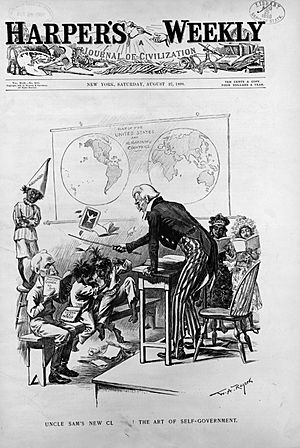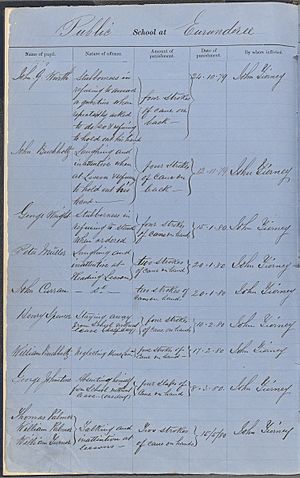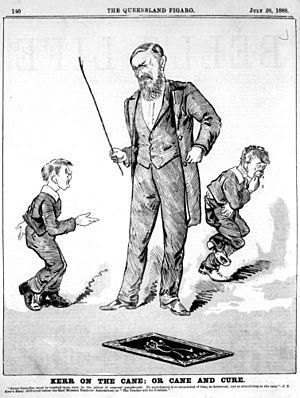School discipline facts for kids
When students act in ways that disrupt learning or break school rules, teachers or the school might take action. This action is usually called school discipline. Discipline helps guide students' behavior and sets boundaries. It teaches them to be responsible for themselves, others, and their surroundings.
Every school has a set of rules. If students break these rules, there are consequences. For example, rules might say students need to wear a school uniform or be on time for class. If students do not follow these rules, they might face punishment. The word "discipline" also refers to these punishments. The goal of discipline is to stop behaviors or attitudes that are harmful or go against school policies. Long ago, schools often used physical punishment. Today, schools also try to reward good behavior.
Contents
Why School Discipline Matters
It is important to create a safe and fun place for children to learn. Many people think discipline is the same as classroom management. But discipline is just one part of managing a classroom. Good discipline can help both individual students and the whole class. The right kind of consequence can help a student think about their actions. It can also teach them about shared values and encourage good behavior in the classroom. Understanding different ways of discipline helps everyone get along better.
What is Corporal Punishment?
In the past, hitting children was a common way to keep order in schools. Teachers acted like parents and could use many types of punishments or rewards. Hitting children with a cane or a stick was a common punishment for misbehavior.
Today, corporal punishment has mostly disappeared from schools in Western countries. This includes all countries in Europe. In the United States, it is not used in public schools in most states. However, some private schools may still allow it, though many have stopped. Official corporal punishment, often by caning, is still common in schools in some parts of Asia, Africa, and the Caribbean.
Most schools around the world still have ways to deal with misbehavior. But these usually do not involve physical punishment. Instead, they use things like detention or suspension. In China, physical punishment in schools is banned by law. However, it still happens in some rural areas. In Australia, public schools have banned it. But in 2019, some private schools in Queensland and the Northern Territory still allowed it.
Other Ways Schools Discipline Students
What is Detention?
Detention is a very common punishment in schools. A student has to go to a specific area of the school at a certain time. They then have to stay there for a set amount of time. If a student does not go to detention without a good reason, they might get a longer detention. Or they might face an even more serious punishment.
What is Counseling?
Sometimes, students who misbehave have to see a school counselor. The goal of counseling is to help the student understand their mistakes. It also helps them find ways to avoid making those mistakes again. Counseling can help students understand what the school expects from them. It also helps them see the results of not meeting those expectations.
What is Suspension?
Suspension means a student is not allowed to attend classes for a certain time. In some cases, the student still comes to school. But they do not see their classmates or teachers that day. Students who are suspended are also not allowed to go to after-school events. This includes things like sports games or school dances.
Schools usually have to tell the student's parents why the student was suspended. Students who are suspended usually still need to do their homework, assignments, and exams.
What is Expulsion?
Expulsion is the most serious punishment a school can give. It means a student's education at that school ends. This is usually a last resort, used when other discipline methods have failed. However, for very serious actions, it might be used for a single offense. Examples include setting fires, pulling false alarms, or attacking staff members. In some places, there are special schools for students who have been expelled from other schools.
Usually, parents can try to challenge the decision to expel a student.
See also
 In Spanish: Disciplina escolar para niños
In Spanish: Disciplina escolar para niños
 | Valerie Thomas |
 | Frederick McKinley Jones |
 | George Edward Alcorn Jr. |
 | Thomas Mensah |




